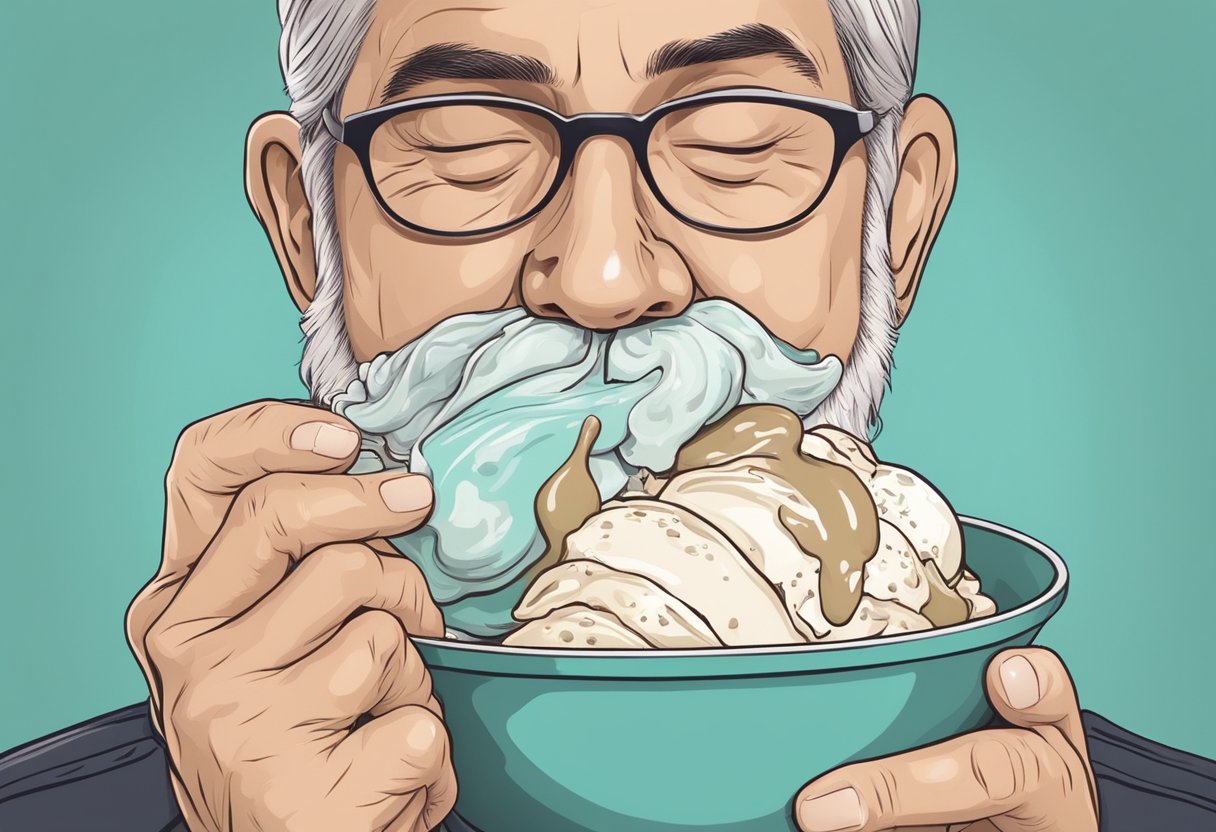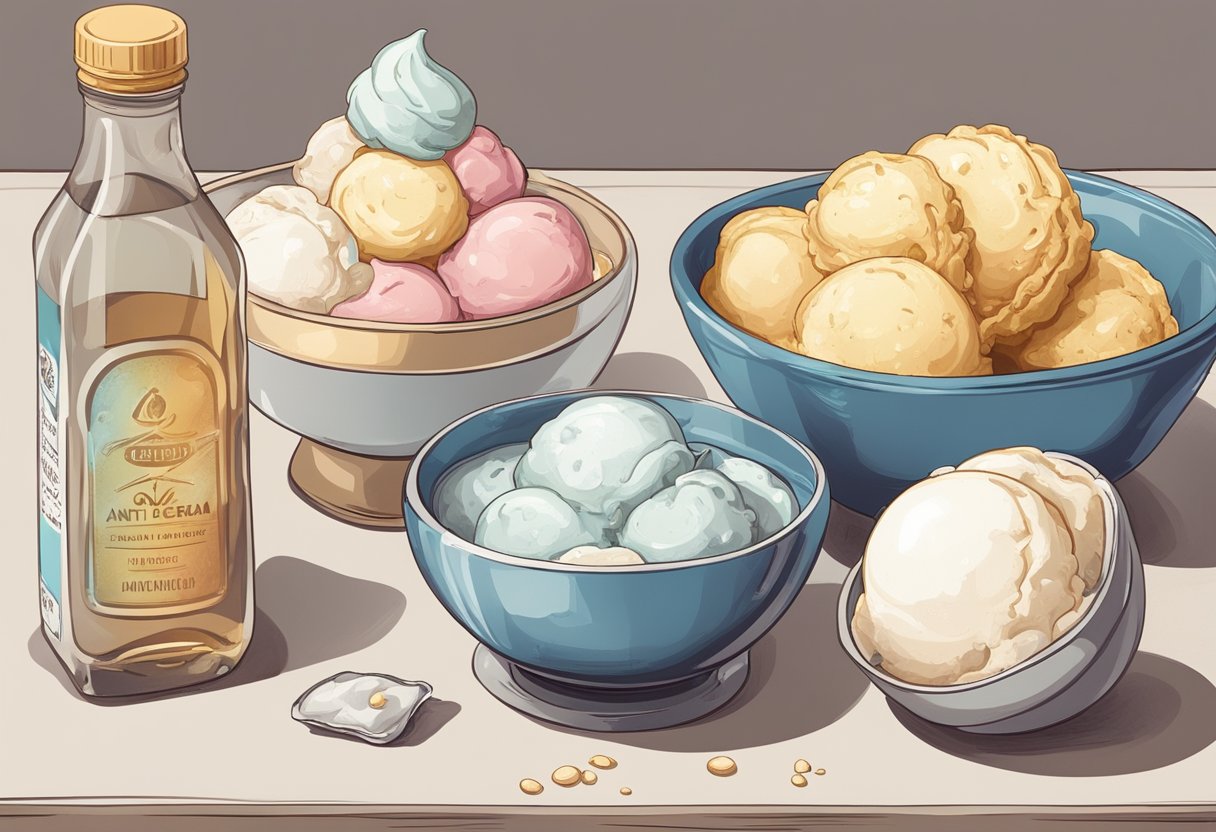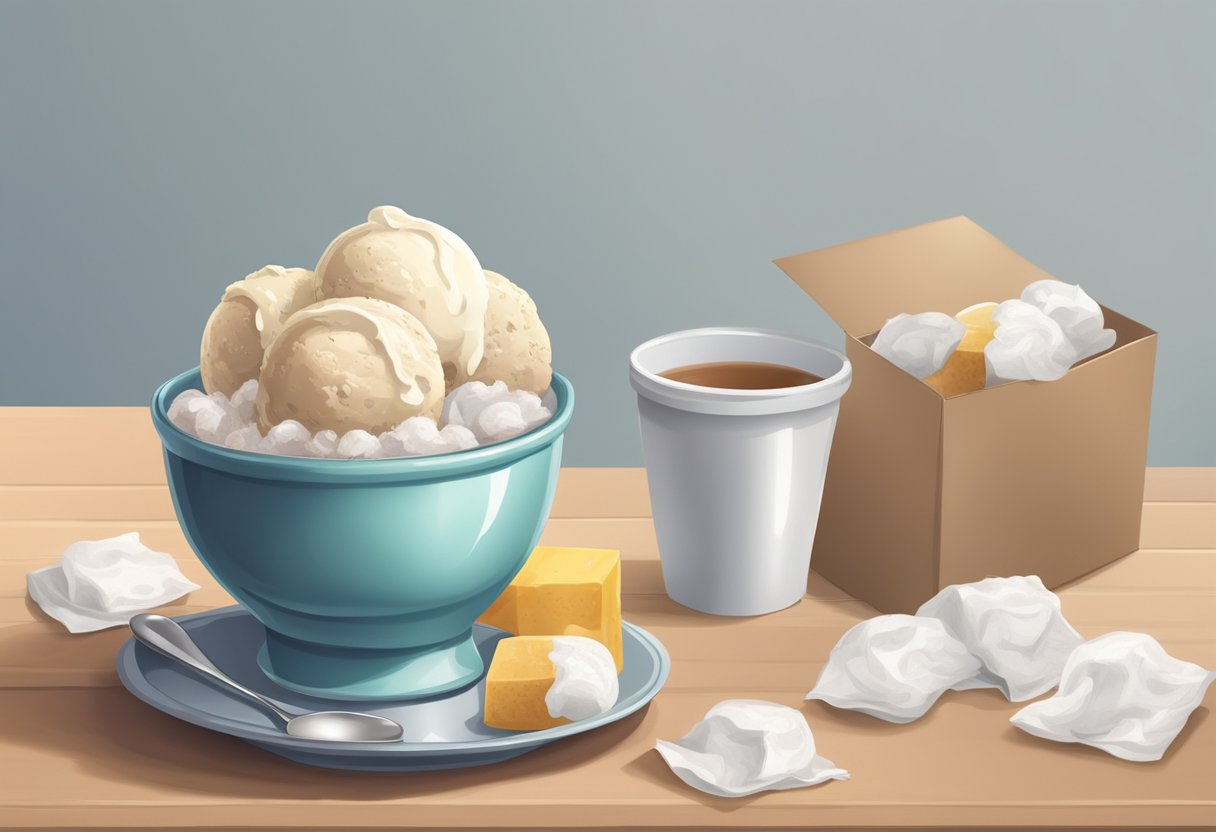Ice cream can offer temporary relief for a sore throat. The effect of ice cream on sore throat is brief, and the treat does not address the root cause of the discomfort. Considering the nutritional content is important, as high sugar levels in ice cream may be detrimental to overall throat health.
When someone suffers from a sore throat, there’s an innate desire to seek immediate relief for the pain and discomfort. One common remedy that people often turn to is ice cream, due to its smooth, cold texture that seems to offer soothing qualities. While it’s true that the coolness of ice cream can provide a temporary numbing effect to a sore throat, it’s important to look at the broader impact this sweet treat can have on throat health and overall wellness when sick.

The temperature and consistency of ice cream can indeed be comforting, but they are not a cure for a sore throat. The relief is typically momentary, as the underlying causes of the soreness, whether viral or bacterial, remain unaffected by the snack. Moreover, the high sugar content present in most ice creams can sometimes be counterproductive, as sugar can potentially increase inflammation or interfere with immune system function.
What Is a Sore Throat?

A sore throat refers to pain, irritation, or itchiness in the throat. It can occur due to various reasons, including viral or bacterial infections. When the throat becomes inflamed, which may cause difficulty or discomfort while swallowing, it may indicate a sore throat.
Common Causes
- Viral infection: Often a symptom of the common cold or other respiratory tract infections.
- Bacterial infection: Notably strep throat, which can cause severe throat pain.
Symptoms to Look For
- Pain or a scratchy sensation in the throat
- Pain that worsens with swallowing or talking
- Swollen, red tonsils, sometimes with white patches or streaks of pus
When the Immune System Responds
The body’s immune system typically fights off the infection causing the sore throat. This may result in symptoms getting temporarily worse before they improve.
Dealing with Serious Illness
In some cases, a sore throat could be a sign of a serious illness. If symptoms persist, it is important to consult a healthcare provider.
| Symptom | Possible Cause |
|---|---|
| Sudden severe pain | Bacterial infection |
| Prolonged symptoms | Serious illness |
| Accompanied by fever, rash | Streptococcal infection |
Preventive Measures
- Regular hand washing to avoid infections
- Avoiding close contact with people who are sick
A sore throat can range from a simple irritation to an indicator of a more serious condition. It is essential to monitor symptoms and seek professional medical advice if they do not improve.
Is Ice Cream Beneficial for Sore Throats?

Temporary relief from throat discomfort can be achieved through eating ice cream. Its cold temperature may help to numb the pain, and the creamy texture can be soothing as it goes down the throat. The following points illustrate the impact of ice cream on sore throats:
Soothing Effect:
- The coolness of ice cream can provide a soothing sensation.
- It can act as a temporary local anesthetic, reducing the sensation of pain.
Ease of Swallowing:
- Ice cream’s creamy consistency can make swallowing less painful for someone with a sore throat.
However, there are factors to consider regarding the consumption of ice cream when experiencing a sore throat:
| Aspect | Detail |
|---|---|
| Sugar Content | High sugar levels in ice cream can potentially lead to more throat irritation. |
| Dairy Concerns | Some believe dairy can thicken mucus, which might worsen throat discomfort. |
| Nutritional Value | Ice cream should not replace more nutritious soothing foods or cold liquids. |
In conclusion, while cold and creamy foods such as ice cream can help ease pain from a sore throat, they are not a cure and should be consumed in moderation alongside other remedies and treatments.
The Role of Temperature in Throat Relief

Temperature plays a significant role in managing sore throat symptoms by providing relief through either cooling or warming the throat’s lining, which can disrupt the transmission of pain signals.
Benefits of Cold Foods: Are They Truly Soothing for a Sore Throat?
Cold foods can provide immediate, though temporary, pain relief for a sore throat. The numbing effect, particularly from cold items such as ice cream, can lead to a reduction in pain sensation. It can soothe the throat’s lining, often making it a go-to remedy for relief.
- Numbing effect: Cold foods can temporarily dull pain signals.
- Cold drinks: May offer a soothing sensation when swallowing.
Potential Benefits of Warm Foods: Can They Assist in Throat Comfort?
Warm foods and drinks might help in soothing the throat lining. Warm teas and warm water can be comforting, with the heat potentially helping to relax the throat muscles and improve circulation which can contribute to the healing process.
- Warm teas: May provide a coating effect that eases discomfort.
- Warm water: Gargling can help reduce throat inflammation.
Comparing Hot and Cold Foods: Which Is More Effective for Throat Relief?
| Cold Foods | Hot Foods |
|---|---|
| Temporary pain relief | Potential to relax throat muscles |
| Can numb the throat | Might improve circulation in the throat area |
| Soothing sensation | Warmth may contribute to a feeling of relief |
Cold and hot foods offer different types of relief for a sore throat. The choice between them should consider the nature and severity of the sore throat, as well as personal comfort preference.
When to Avoid Certain Temperatures: Are There Times To Choose One Over the Other?
Certain temperatures should be avoided depending on the condition of the throat. For an already inflamed throat, very hot foods may aggravate the condition, while exceedingly cold foods might be too harsh for some individuals.
- For an inflamed throat:
- Avoid overly hot foods that can aggravate sore throats.
- Opt for mildly warm foods to prevent further irritation.
- When eating cold foods:
- Choose them for immediate relief but not as a long-term solution.
- Be aware that the sugar content in ice cream could contribute to irritation.
Nutritional Considerations When Sick

When an individual is ill, careful selection of food can support the healing process. Food choices should support a strong immune response and be comforting yet nutritious.
Foods to Embrace
One should turn to nutrient-dense foods, as these provide significant amounts of vitamins and minerals that are critical for health. Nutrient-dense foods also offer more nourishment per calorie, which is essential when the body may need less energy due to reduced activity during illness. Here is a list of foods that are advisable:
-
Healthy Fats: Include sources of healthy fats such as avocados and nuts, which provide a sustained energy source and support cell function.
-
Soft Foods: Those experiencing a sore throat can benefit from soft foods like mashed potatoes that are easy to swallow and soothe the throat.
-
Probiotic Bacteria: Yogurt and other foods with probiotic bacteria support gut health, which is linked to a strong immune system.
-
Chicken Soup: It’s not just a folk remedy; chicken soup can help alleviate symptoms, acting as a source of hydration, essential nutrients, and warmth.
-
Nutrient Dense Foods:
Food Type Examples Fruits Bananas, avocados Vegetables Leafy greens, carrots Protein Chicken breast, beans
Foods to Avoid
Certain foods can exacerbate symptoms or hinder recovery when sick and should be avoided. These are food items that may irritate the throat, challenge the digestive system, or potentially weaken the immune response.
-
Spicy Foods: While they can clear congestion, spicy foods may also irritate the throat and should be avoided if one’s throat is sensitive.
-
Acidic Foods: Foods high in acid, such as citrus fruits and tomatoes, can further irritate a sore throat.
-
Too Much Sugar: Excess sugar can cause inflammation and may hinder the immune system’s effectiveness.
-
Foods and Beverages High in Sugar:
Avoid Reason Soda Can contribute to dehydration Ice cream Temporarily soothing but high in sugar Candies Provide no nutritional value and may inflame a sore throat
Are There Other Ways to Soothe a Sore Throat?

Yes, there are several alternative techniques for soothing a sore throat. While ice cream may provide temporary relief, its sugar content can potentially worsen symptoms in the long run. It’s important to consider other methods that can offer comfort and aid recovery.
Gargling Solutions
- Salt Water: Gargling with warm salt water can help soothe throat pain and reduce swelling. A typical recipe is:
- 1/2 teaspoon of salt
- 1 cup of warm water
Warm Liquids
- Tea: Warm tea can provide relief for a sore throat. Drinking herbal teas like chamomile or ginger can be particularly soothing due to their anti-inflammatory properties.
Over-the-Counter Remedies
| Remedy Type | Examples | Description |
|---|---|---|
| Throat Sprays | Phenol-based sprays | These can numb the throat and provide temporary relief |
| Lozenges | Honey-lemon, menthol | Helps in increasing saliva and easing discomfort |
At-Home Treatments
- Home Remedies:
- Honey: It’s known for its natural soothing effects and can be added to tea or taken alone.
- Humidifiers: Using a humidifier adds moisture to the air, which can relieve throat irritation.
While these methods are commonly used and can provide relief, they should be complemented with adequate rest and hydration. If symptoms persist, one should consult a healthcare professional.
How Does Hydration Affect the Throat?

Adequate hydration is essential for maintaining a healthy throat. Adequate fluid intake keeps the throat moist and can help soothe irritation. Here is how different types of beverages can impact throat health:
Cold Liquids:
- Temporary relief: Cold drinks, such as iced water, can numb the throat and provide short-term pain relief.
- Mucus Thickness: They may also temporarily thicken mucus, which some find provides a protective coating over the throat.
| Fluid Type | Effect on Throat |
|---|---|
| Cold Liquids | – Numbs pain – May thicken mucus temporarily |
Warm Liquids:
- Irritation Reduction: Warm beverages can reduce throat irritation and help to keep the mucus thin and flowing.
- Hydration: They are also effective for hydration, which is crucial when the body is producing excess mucus due to illness.
| Fluid Type | Effect on Throat |
|---|---|
| Warm Liquids | – Reduces irritation – Keeps mucus thin and flowing |
Overall Hydration:
- Fluid Intake: It is crucial to maintain fluid intake to prevent the throat from becoming dry, which can exacerbate discomfort.
- Mucus Production: Proper hydration helps in maintaining normal mucus production, which protects the throat from irritants.
| Hydration Benefits | Description |
|---|---|
| Throat Moisture | Prevents dryness and reduces potential irritation |
| Mucus Production | Protects throat lining and assists in trapping pathogens |
Is Sugar Intake Important When Eating Ice Cream For a Sore Throat?

One should be cautious about the sugar content in ice cream when consumed for sore throat relief. While cold treats like ice cream can be soothing, they often contain high levels of added sugar which can potentially aggravate throat irritation and delay healing.
When opting for ice cream to ease a sore throat, it’s beneficial to consider the following:
- Low Sugar Options: Choose ice creams labeled as low sugar or sugar-free. This can help in minimizing the intake of added sugars, which should be limited, especially when unwell.
| Type of Ice Cream | Sugar Content |
|---|---|
| Regular | High in added sugar |
| Low Sugar | Reduced sugar level |
| Sugar-Free | Minimal or no added sugar |
-
Monitor Sugar Intake: Be mindful of overall daily sugar consumption. The American Heart Association recommends a maximum of 25 grams (6 teaspoons) of added sugar per day for women and 36 grams (9 teaspoons) for men.
Alternatives to Ice Cream: Consider other cold alternatives that are naturally low in sugar, such as:
- Greek yogurt (unsweetened)
- Smoothies (with low-sugar fruits and no added sugar)
- Fruit popsicles (made with real fruit and no added sugar)
Consuming too much sugar can suppress the immune system and increase inflammation, which is counterproductive when recovering from a sore throat. Therefore, managing sugar intake from ice cream and other foods is crucial during recovery.
What Is the Significance of Anti-Inflammatories for a Sore Throat?

Anti-inflammatory medications are significant for sore throats as they can reduce inflammation and alleviate pain. These medications may come in various forms:
- Oral tablets: Taken systemically to reduce inflammation throughout the body.
- Throat sprays: Offering localized anti-inflammatory effects.
The importance of anti-inflammatory properties in treating a sore throat can be illustrated in the following table:
| Form | Benefit | Example |
|---|---|---|
| Oral Anti-Inflammatory | Reduces overall throat inflammation | Ibuprofen |
| Throat Sprays | Directly targets throat inflammation, providing quick relief | Phenol-based sprays |
Additionally, here is a list of reasons why anti-inflammatories are effective for sore throats:
- Pain Reduction: They can decrease the production of substances in the body that cause pain and swelling.
- Swelling Control: By lessening inflammation, they can help to reduce the swollen tissues in the throat, making it easier to swallow.
- General Comfort: Anti-inflammatories can improve overall comfort, allowing individuals to eat, drink, and speak more easily.
Despite the benefits, it is vital for individuals to use anti-inflammatories according to medical advice, as improper use may lead to side effects. They should also consider that while anti-inflammatories can provide relief, they do not cure the underlying cause of a sore throat.
Foods That May Exacerbate Symptoms
Certain foods have the potential to worsen the symptoms of a sore throat. The main culprits often include acidic and spicy foods that can further irritate the throat lining, and dairy products that may increase mucus production, leading to discomfort.
Acidic and Spicy Foods
They can irritate the throat. Consuming acidic foods like citrus fruits, or spicy items, may contribute to throat discomfort and acid reflux, exacerbating a sore throat.
Acidic Foods to Limit:
- Citrus fruits (oranges, lemons)
- Tomatoes
- Vinegar-based products
Spicy Foods to Minimize:
- Hot peppers
- Curries
- Mustards
Dairy and Mucus Production
They may increase mucus production. Dairy products, often assumed soothing, can lead to increased mucus production, which might aggravate postnasal drip and throat irritation.
- Dairy Products to Consider With Caution:
- Milk
- Cheese
- Yogurt
While items like ice cream provide initial soothing relief, they can potentially lead to a thicker postnasal drip, prompting additional discomfort during a sore throat.
How Does Eating Ice Cream Affect the Immune Response?

Eating ice cream does not directly boost the immune system; in fact, its high sugar content can potentially lead to inflammation which may indirectly impede immune response. The immune system relies on various components, such as white blood cells, to fight against infections and diseases.
- White Blood Cells: Essential for combating pathogens, these cells are unaffected by ice cream consumption.
The body requires certain nutrients to maintain a strong immune system:
| Nutrient | Function | Food Source |
|---|---|---|
| Vitamin C | Supports the function of immune cells | Citrus fruits, strawberries, kiwi |
| Antioxidants | Protect cells from damage | Berries, dark chocolate, beans |
Ice cream typically lacks these immune-boosting nutrients. However, some specific types of ice cream might be fortified with vitamins and minerals, but these are exceptions rather than the rule.
For optimal immune support, they should focus on:
- Fruits and Vegetables: High in vitamins, including Vitamin C, and other antioxidants.
- Protein: Vital for the repair and building of immune system components.
- Hydration: Essential for overall cellular function, including immune cells.
In summary, while ice cream can provide temporary relief due to its cold temperature, it does not contribute positively to the immune system’s strength. For a stronger immune response, a diet rich in vitamins and low in processed sugars is recommended.
When Should One Seek Medical Care for a Sore Throat?

Medical care should be sought if symptoms of a sore throat worsen significantly, persist beyond a few days, or are accompanied by other concerning symptoms. It is important to monitor the progression of a sore throat, as it can sometimes be a sign of a more serious illness that requires medical attention.
If an individual experiences any of the following, they should consult a healthcare provider:
- A sore throat that persists for more than a week
- Difficulty breathing or swallowing
- Joint pain
- An earache
- A rash
- Fever over 101°F (38.3°C)
- Blood in saliva or phlegm
- Frequently recurring sore throats
- A lump in the neck
- Hoarseness lasting over two weeks
| Symptom | Action Required |
|---|---|
| Sore throat > 1 week | Seek medical advice |
| Difficulty breathing/swallowing | Immediate medical attention |
| Accompanying rash or joint pain | Consult a healthcare provider |
| High or persistent fever | Seek medical advice |
| Blood in saliva or phlegm | Immediate medical attention |
These symptoms may indicate that the sore throat is due to an infection that requires medical treatment, such as strep throat, or another condition that necessitates professional intervention. If an individual’s symptoms worsen after initial improvement, or if they have a compromised immune system, medical care should also be sought. Prompt attention from a healthcare provider ensures proper diagnosis and treatment.
Frequently Asked Questions

In this section, readers will find concise answers to common questions regarding ice cream consumption when they have a sore throat.
Can eating ice cream alleviate a sore throat?
Yes, it can provide temporary relief. The cold sensation of ice cream can be soothing for a sore throat. However, this relief is typically brief and doesn’t treat the underlying cause.
Does ice cream consumption worsen a cough?
Ice cream may worsen a cough for some individuals. The creamy texture can sometimes create phlegm, which can aggravate coughing, especially in those who are sensitive to dairy products.
What are the best kinds of ice cream for a sore throat?
Ice creams low in sugar and fat are considered better choices.
| Type | Reason |
|---|---|
| Low-fat | Less irritating to the throat |
| Low-sugar | Reduces inflammation |
| Non-dairy | Good for lactose intolerance |
| Probiotic-rich | May help soothe the throat |
Could ice cream potentially lead to tonsillitis?
No, ice cream does not cause tonsillitis. Tonsillitis is an infection typically caused by viruses or bacteria, not by consuming cold foods like ice cream.
Is it advisable to eat ice cream when experiencing a sore throat?
Yes, but with caution. Ice cream can soothe a sore throat, but it’s not a cure and should be consumed in moderation, considering its sugar content and any individual sensitivities to dairy.
Are there specific foods that should be avoided when you have a sore throat?
Certain foods can aggravate a sore throat and should be avoided. These include:
- Citrus fruits: Can irritate the throat
- Spicy foods: Can cause discomfort
- Crunchy snacks: Can scratch and worsen throat pain
- Sugary foods and drinks: May increase inflammation
